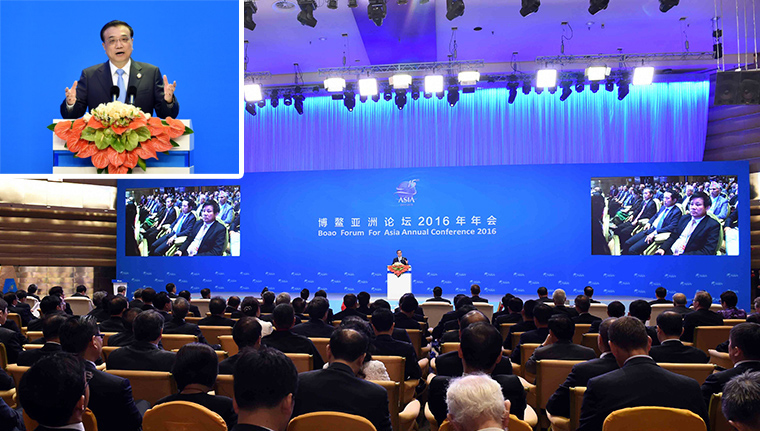Boao forum: Growth in Asia helps to bolster ailing world economy

Chinese Premier Li Keqiang delivers a keynote speech at the opening ceremony of the 2016 Annual Conference of the Boao Forum for Asia, which was held in Hainan from March 22 to 25.
Asia remains an engine for world economic growth and the progress of world civilization, participants said at the 2016 Annual Conference of the Boao Forum for Asia, which was held in Hainan from March 22 to 25.
In 2015, the Asian economy grew at a higher rate and had a larger share amid a global economic downturn, they said, adding that Asia’s trade volume accounted for one-third of the world total, making it one of the most dynamic regions.
The annual conference, under the theme of "Asia's New Future: New Dynamics, New Vision," gathered leaders in government, business and academia from around the world, who shared perspectives on the future development of Asia. Chinese Premier Li Keqiang delivered a keynote speech during the opening ceremony on March 24.
Economic vitality
Scholars pointed out the complicated background of the conference. Economic cooperation and integration in the region has ushered in a period of rapid development, and a new outlook for Asia is unfolding. However, the complexities of the world economy have added to the uncertainty.
On March 22, the forum released the Progress of Asian Economic Integration Annual Report 2016. According to the report, due to the changes in the world economy, growth in Asian trade lagged behind GDP growth, while the exchange of intermediate goods and trade interdependency between Asian countries decreased. For instance, trade of main components decreased to 59 percent in 2014 from more than 61 percent in 2012. However, its share of of global exports has continued to rise.
The Development of Emerging Economies Annual Report 2016 issued on the same day pointed out that the 11 major emerging economies of the G20 had slower growth, down from 5.1 percent in 2014 to 4.5 percent in 2015, but they still contributed more than half of the world's economic growth.
Yu Yongding, a research fellow from the Institute of World Economics and Politics at the Chinese Academy of Social Sciences (CASS) and a CASS Member, said China is still the most important driving force for the global economy and is increasingly becoming the mainstay of emerging economies.
Developed countries had a high demand for imports before the outbreak of the financial crisis, Yu said. In light of the sluggish global economic recovery, it will be difficult to achieve Asian cooperation by only relying on overseas market demand. In addition to expanding exports and maintaining export competitiveness, Asia should prop up internal consumption and investment, he said.
This year marks the beginning of the 13th Five-Year Plan. Chinese topics, such as supply-side reform, the Internet and the Beijing-Tianjin-Hebei Integration, were also highlights of the conference.
Sub-regional cooperation
One day before he attended the opening ceremony of the Boao forum, Li hosted the First Lancang Mekong Cooperation (LMC) Leaders’ Meeting in Sanya, Hainan, during which he exchanged views with the leaders of the five other member countries on promoting the cooperation mechanism in this area.
This shows the advantages of China as a host country, said Zhou Fangyin, a professor from the Guangdong Institute for International Strategies. Unlike intergovernmental summits, such as the G20 and the East Asia Summit, and nongovernmental forums, such as the World Economic Forum, the Boao Forum for Asia combines government and civil participation, he said.
It has now been 15 years since 25 Asian countries proposed to establish the forum. As a nongovernmental international organization, the Boao Forum for Asia provides a significant platform for governments, academics and businessmen to discuss economics, society, the environment and other issues.
Zhou said the introduction of the Lancang-Mekong Cooperation Mechanism has set an example for sub-regional cooperation in Asia, which indicates that the Boao forum is paying more attention to regional and sub-regional cooperation.
He said cooperation in the Mekong area has progressed slowly, and the China-proposed Lancang-Mekong cooperation framework will infuse vitality into cooperation in the area. The framework, together with the Asian Infrastructure Investment Bank, the ‘Belt and Road’ initiative and China-ASEAN cooperation, will pioneer a new model of cooperation in Asia, he added.
In addition, scholars said the Boao forum reflects China’s efforts to strengthen cooperation with neighboring countries.
They suggested seeking common ground despite existing problems. For instance, ASEAN cooperation should be steadily promoted while putting aside the South China Sea disputes. They said China attaches importance to common development, real effects and efficiency, which is different from the Western-led cooperation model, which emphasizes mechanisms and a high entry threshold.
Zhang Junrong is a reporter at the Chinese Social Sciences Today.
